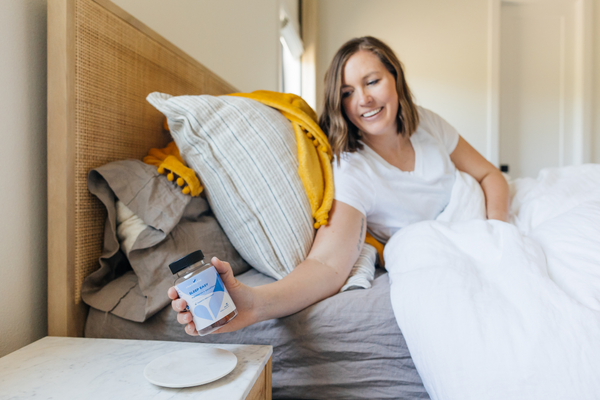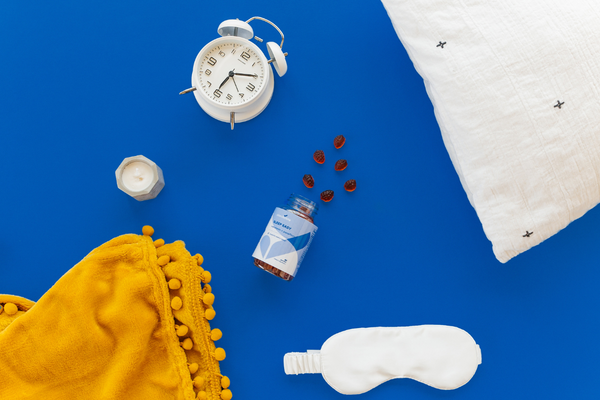
From soothing anxiety to improving mood, there are many benefits to getting a good night’s sleep. Learn more about what sleep can do for your mind and body, plus some great sleep tips!
The Importance of Sleep
Sleep, it’s our best friend and our worst enemy when the alarm clock goes off each morning.
Sleep is a necessary human function — it allows our brains to recharge and the body to rest. When we don’t sleep long or well enough, our bodies don’t get the full benefits of sleep, such as muscle repair and memory consolidation.
Research shows that healthy adults between 18-65 need between 7 and 9 hours of sleep per night to keep us functioning and let’s face it, less cranky. But as reported in recent sleep studies, more than 1/3 of American adults are not getting enough sleep. According to the American Psychological Association, American adults sleep an average of 6.7 hours a night, on average.
Stress & Insomnia
In addition, 42% of adults report that their sleep quality is fair or poor. And 43% report that stress has caused them to lie awake at night in the past month. And adults who sleep fewer than eight hours a night report higher stress levels than those who sleep at least eight hours. So, basically stress is causing insomnia and insomnia is causing stress. Talk about a catch-22!
Although stress is a normal part of life, when it takes a toll on your body and affects your sleep, that’s when changes need to be made.
Aside from stress, lack of sleep can cause delirium and exhaustion, and also take its toll on your physical and mental health. It can lead to more severe health conditions including obesity, risk of diabetes, depression, and hypertension.
But, fortunately, there are ways to battle the sleep conundrum and ultimately get the rest you need.

Top 5 Tips to Get Better Sleep
If you’re tired of tossing and turning at night, a few lifestyle changes can help you get your zzz’s.
Unhealthy daytime habits could be the culprit, adversely affecting your mood, brain, heart health, immune system, creativity, vitality, and weight.
These simple tips will help you sleep better, feel energetic, and be more productive during the day, so you can be your best self.
Tip 1: Be consistent.
Go to bed at the same time each night and get up at the same time each morning — including the weekends. Yes, there might be one night you stay out late or sleep in, but ultimately consistency will train your body to sleep.
Getting in sync with your body’s natural sleep-wake cycle, or circadian rhythm, is one of the most important strategies for sleeping better.
Choose a bedtime when you normally feel tired. If you’re getting enough sleep, you should wake up naturally without an alarm. If you need an alarm clock, you may need an earlier bedtime.
Tip 2: Control your exposure to light.
Make sure your bedroom is quiet, dark, relaxing, and at a comfortable temperature.
Turn off all electronic devices, such as TVs, computers, and smart phones at least 30 minutes before bed. This isn’t only to set the mood, but melatonin, the naturally occurring hormone in our body that helps regulate your sleep-wake cycle, is controlled by light exposure.
Your brain secretes more melatonin when it’s dark — making you sleepy — and less when it’s light — making you more alert.
And as we age, the amount of melatonin we naturally produce decreases. Therefore adding a melatonin supplement to your bedtime routine might be the way to go. Aside from the many wondrous benefits melatonin offers, including the ability to reduce PMS symptoms, fight off migraines, and keep diabetes at bay, melatonin tells your body it’s time for bed.
Try Checkable’s Sleep Easy Melatonin Gummies, a perfect hybrid of natural sleep aids and vitamins, including melatonin, vitamin B6, and natural passiflora extract to gently lull you to sleep without groggy side effects.
Tip 3: Exercise during the day.
Studies indicate that people who exercise regularly sleep better at night and are less stressed. Regular exercise also improves the symptoms of insomnia and sleep apnea, and increases the amount of time you spend in the deep, restorative stages of sleep. Being physically active during the day can help you fall asleep more easily at night.
Tip 4: Wind down and create a bedtime ritual.
Residual stress, worry, and anger from your day can make it very difficult to sleep well. Taking steps to manage your overall stress levels and learning how to curb the worry habit can make it easier to unwind at night.
You can also try developing a calming bedtime ritual to help you prepare your mind for sleep, such as practicing a relaxation technique, taking a warm bath, listening to soft music, meditation or reading.
If something is worrying you before bedtime, try to nip it in the bud before getting into bed. Try to alleviate the worry, whether it’s creating a plan for tomorrow or settling an argument.
Tip 5: Pay attention to what you eat and drink.
It’s a good idea to avoid having meals right before bedtime, because discomfort might keep you awake.
But you don’t want to go to bed hungry either or you’ll find yourself having a midnight snack.
You should also be mindful of any prescription drugs you might be taking that might keep you awake or more alert, as well as drinks that are caffeinated. Alcohol can also interfere with your sleep. And just like with anything else, water is your best friend.

If you follow these tips, you’ll be on your way to the Land of Nod in no time. These proven strategies will help break the insomnia cycle. And improve your sleep quantity and quality, so you can feel good, well-rested, and ultimately be your best self.
















